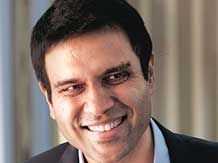 Rehan Yar Khan (below left), a serial entrepreneur, has led 15 early-stage investments in various companies including Druva, Olacabs, Reach Accountant, Sapience, among others. Khan is a founding member of Indian Angel Network's (IAN) Mumbai Chapter and a honorary member of Harvard Angels and led its initial investment in India. As the founder and managing partner of Orios Venture Partners, he has launched a Rs 300-crore (Rs 3-billion) fund, mainly for investments in start-ups. He speaks to Reghu Balakrishnan on the challenges and potentials in funding start-ups in India. Excerpts:
Rehan Yar Khan (below left), a serial entrepreneur, has led 15 early-stage investments in various companies including Druva, Olacabs, Reach Accountant, Sapience, among others. Khan is a founding member of Indian Angel Network's (IAN) Mumbai Chapter and a honorary member of Harvard Angels and led its initial investment in India. As the founder and managing partner of Orios Venture Partners, he has launched a Rs 300-crore (Rs 3-billion) fund, mainly for investments in start-ups. He speaks to Reghu Balakrishnan on the challenges and potentials in funding start-ups in India. Excerpts:
What's the rationale behind launching a venture capital (VC) fund in the start-up space?
We saw the need for a VC fund on both sides of the network. On the start-up side, we saw that India has produced approximately 11 'billion dollar plus' companies in the last decade.
We expect this number to increase significantly and, hence, the entrepreneurs today would not only require more capital but also quality advice that can guide through increased competition in this space from other start-up, domestic, co-operates and foreign players.
On the investor side, we realised most of the funds have foreign capital, thus closing down the opportunity to the Indian investor.
We tried to address this need by raising a 100 per cent domestic fund so that domestic individual investors can get a piece of the pie.
What are the major challenges in funding Indian start-ups?
Indian start-ups these days are on par with their global counterparts.
Entrepreneurial quality today has gone up significantly with more and more entrepreneurs looking at start-ups as a viable career option.
At Orios, our vision is to enable these entrepreneurs to travel the next phase of growth, where some of these unique home-grown models can be taken to the global markets.
Among the areas of interest of Orios' new fund are internet and business-to-business software. What is the potential of these?
The Indian e-commerce industry is at a nascent stage with 25 million online buyers this year. This is expected to increase to over 100 million online buyers by 2020.
In the same period, the average basket size of online shopping transactions is expected to grow at a 25 per cent compounded average growth rate, resulting in an industry growth of more than 60 per cent. The industry in India, consisting of various models such as general marketplace model (Flipkart, Amazon, etc), has already seen consolidation.
 Recent investment announcements by Flipkart and Amazon are expected to increase the barriers of entry into this space.
Recent investment announcements by Flipkart and Amazon are expected to increase the barriers of entry into this space.
As an early-stage fund, we see the next wave of opportunities arising from certain vertically-focused market places and online brands, as has been seen in China and the US.
Similarly, software products is a $2-billion industry in India (two per cent of overall IT industry). Nasscom believes software products would be a $100-billion sector by 2025.
We have already seen companies such as Mu Sigma with a 'billion dollar plus' valuation emerge in this space. We expect many more such companies to emerge in the next decade.
E-commerce has seen issues of high valuation. What's your view?
If you analyse Flipkart, they are positive on a unit economic basis at the operational level. Most of the money is going into acquiring new customers and making infrastructure investments.
If you take the lifetime value of a customer into account, it would be wrong to see marketing as an expense.
It is rather an investment to acquire a customer throughout the life cycle.
Growth is expected to be driven by more women-centric categories such as fashion, footwear and accessories with mobile emerging as the preferred medium for online transactions. In the future, a significant portion of the growth is expected to be driven by Tier-2 and Tier-3 cities.
Essentially, e-commerce will serve as conduit to the growing aspirational needs in these locations.
If you look at some of the large e-commerce companies in China, more than 40 per cent of the revenue comes from Tier-2 and -3 locations.
The new breed of start-ups that emerge will need to differentiate themselves from the big boys.
We see big opportunity in some of the successful international models that have yet not come to India along with some unique home-grown models that can be targeted at the global markets.
Compared to other markets such as China, what are growth potentials for start-ups in India?
E-commerce in India is still at an early stage of growth. The recent investment in Flipkart and Amazon is an endorsement of the growth potential of the industry.
The industry is expected to grow from $2 billion in 2013 to $29 billion in 2020, representing a growth of 60 per cent CAGR.
Today, India's e-commerce industry is where the US was in 2003 and China was in 2007.
Currently, India's internet penetration is approximately one-third of China and the size of the industry is approximately one-sixtieth of China, indicating that future growth is going to come from both increased internet penetration and increased adoption.
The strong investments in this sector going into technology, manpower, products and customer acquisitions will ultimately help grow the concept of shopping online.
What are your major concerns on Indian investment scenario?
Unlike most funds, our fund is completely raised domestically from high net worth individuals and family businesses.
Given that most of the investors are new to the concept of venture capital investing, a key challenge for us was to educate them on the space.
A lot of our investors have heard about this space through the newspapers and had concerns around valuation.
We had to educate these investors about the potential of this space including the possibility of some of the e-commerce players emerging as the largest retailers in India and also relevant examples from other countries such as China and the US.












 © 2025
© 2025